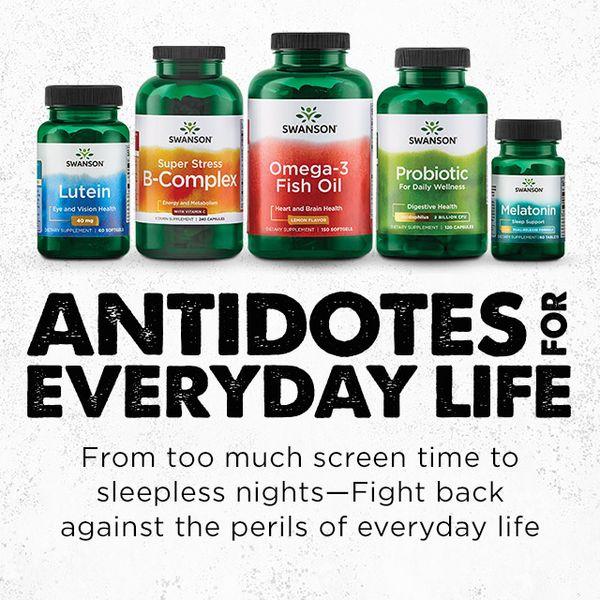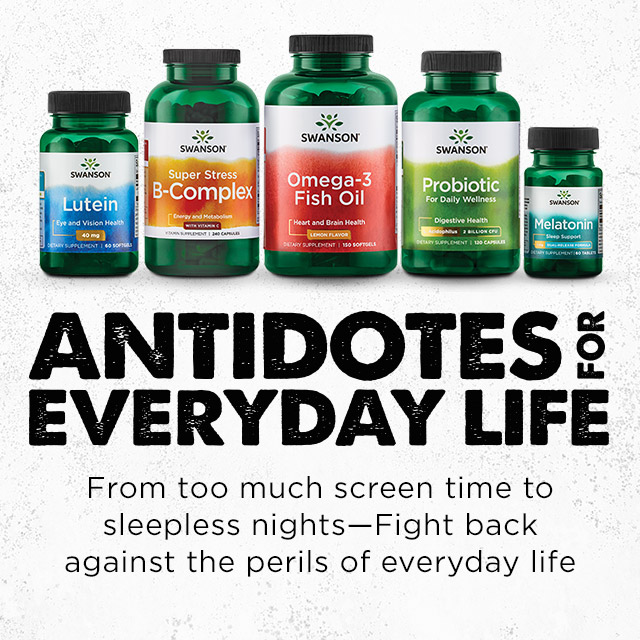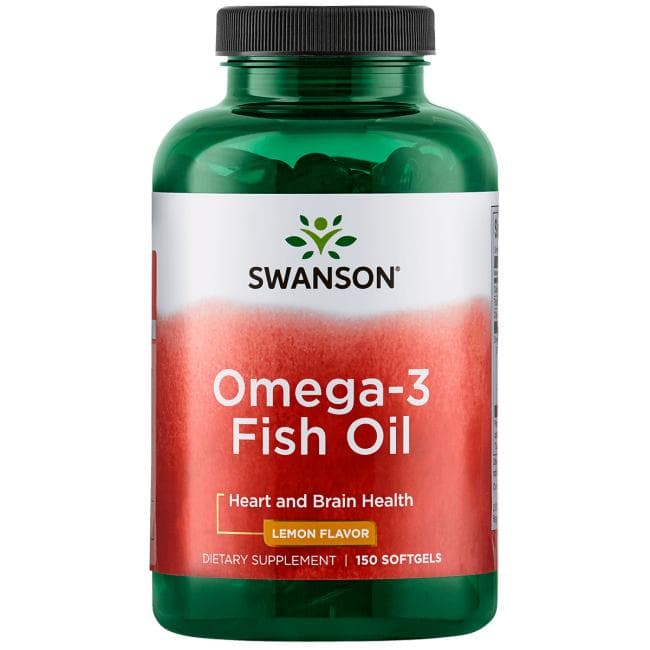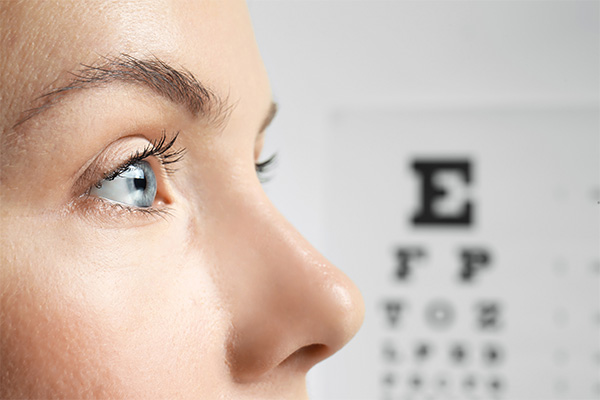Solutions to Life’s Challenges Made Easy
From too much screen time to work stress and sleepless nights—life throws a lot your way, and it can add up to impact your health. But in this always-on world, how many of us stop to really think about it?
If you’re like most people, you may see these modern perils as just an inevitable part of everyday life. But it doesn’t have to be that way: you CAN fight back! And Swanson Health has our Antidotes for Everyday Life to help you do just that. Here’s an overview of these time-tested antidotes, the science behind them and when and how to take them.
What are the Antidotes for Everyday Life?
We looked closely at some of the most common health curveballs life throws our way, including never-ending exposure to digital device screens, too much stress, not getting enough sleep and digestive health concerns due to modern diets. Working with Swanson Health nutritionists and scientists, we created a modern-day toolkit with science-backed antidotes for the most common challenges of everyday life that can affect our health and wellbeing. Here’s the scoop:
For the Always On
The average adult spends 11+ hours a day on digital devices.1 Most of us are in front of computer screens at work, we watch TV at home to unwind, we read the news on our devices and collectively we’re checking our phones about eight billion times per day.2
Why does that matter? With our eyes wide and peering into an endless variety of screens, we expose our retinas to an onslaught of blue light that is truly unique to our digital lives. More blue light is emitted from smartphones and tablet computers than from any other light source.3 And since blue light waves are shorter and more energetic than any other type of light on the visible spectrum, it can contribute to far more concerns for our vision health than the generations before us faced.4 Eye doctors are concerned about it too, with about 50% of eye doctors reporting an increase in digital eye strain and effects from blue light exposure among their patients.5
What’s the antidote for the always on? Macular carotenoids: hard-working, antioxidant plant pigments that help protect your eyes.
The Science Behind Macular Carotenoids
Macular carotenoids are plant pigments that accumulate in the macula, the area of the eye responsible for vision.6 There are two primary macular carotenoids: lutein and zeaxanthin. They are similar in structure and benefit, and by accumulating in the retina, they help filter harmful blue light and provide antioxidant support to the eyes. Research shows that people who consume macular carotenoids experience significantly fewer eye health concerns as they age.7
Get Started
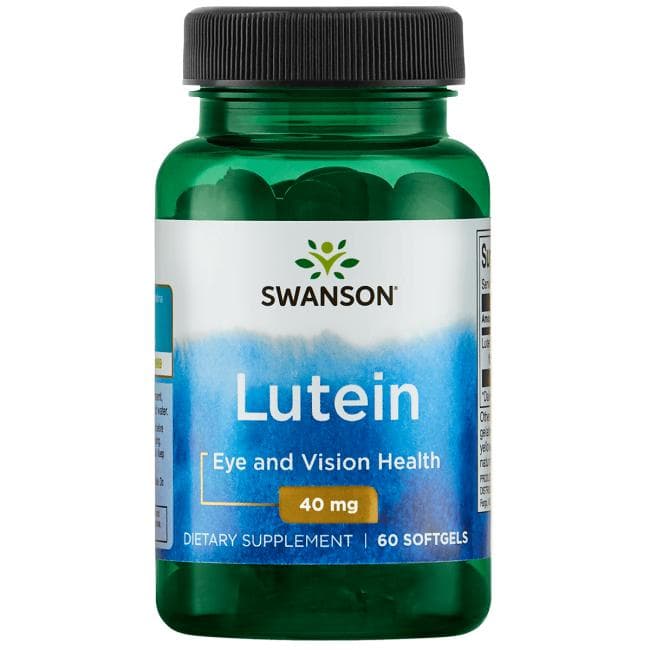 Swanson Ultra Lutein
Swanson Ultra Lutein
This super-potent eye health supplement delivers 40 mg lutein from marigold flower extract to fight eye fatigue and support retina and macula health. It provides indispensable antioxidant protection for your eyes.
Elevate Your Routine
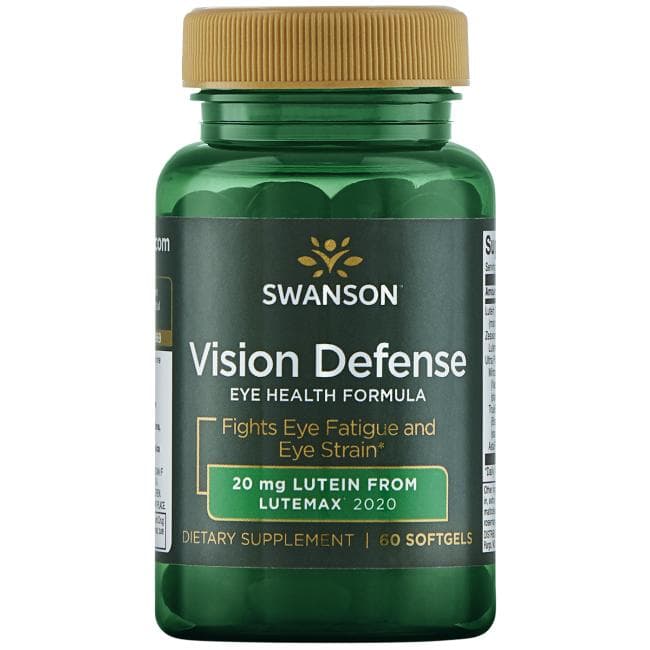
Vision Defense is our award-winning formula for synergistic eye health support with science-backed Lutemax® 2020, which includes lutein and zeaxanthin plus a potent antioxidant blend of bilberry extract, broccoli extract and astaxanthin. Recent research published in the journal Nutrients shows that Lutemax® 2020 helps protect against blue light damage by minimizing oxidative and cellular stress.8
How & When to Take
Both Swanson Ultra Lutein and Swanson Vision Defense can be taken any time of day but should be taken with food and water. It may be easier to remember to take it after dinner if you're rushed at breakfast and lunch through the week.
For the Up ’Til Dawn
So much to do, so little time! And no matter how much we try and convince ourselves otherwise, neuroscience says multitasking is practically impossible for most of us. In fact, it’s not even good for the brain when we try.9
We definitely don’t recommend staying up ’til dawn to get everything done since sleep is really important too, but you can optimize your nutrition to help keep you energized all day long. The family of B vitamins is particularly beneficial for energy production, and the benefits don’t stop there.
How do B Vitamins Help?
There are eight B vitamins, and they all play unique biological roles. Each vitamin provides specific benefits for the body, but they also work together to complete some of the most vital functions, including cell metabolism.10 B-complex vitamins are essential for converting food into fuel that your body can use, making B vitamins popular as energy boosters.
B vitamins promote both mental and physical health, and as a bonus for the busiest among us, research shows that B vitamins may help reduce stress too, so you may get more done, and be less stressed while doing it!10
Get Started

Swanson Super Stress B-Complex with Vitamin C
Swanson Super Stress B Complex is a unique complex that’s specially formulated to help replenish nutrients that are most in demand during high-stress times. Each capsule combines a generous supply of B-complex vitamins with the powerful antioxidant protection of high-potency vitamin C.
Elevate Your Routine
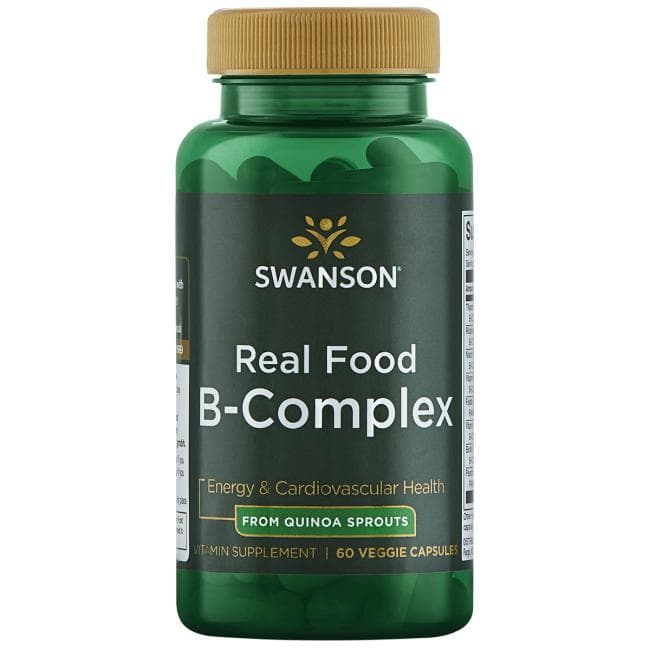 Swanson Real Food B-Complex
Swanson Real Food B-Complex
This premium B-complex formula features B vitamins sourced from organically cultivated quinoa sprouts to support energy production and metabolic health, heart health, mental health and help maintain cell-to-cell communication in the brain. Scientific evidence strongly supports the benefits of getting as many of our nutrients as possible from real food sources to promote better health.11 When you can’t get the concentrations of those nutrients that you need, real food supplements like Swanson’s Real Food B-Complex can help fill those gaps in a wholesome way.
When to Take Vitamin B
Swanson Super Stress B-Complex with Vitamin C can be taken as a single capsule, onece or twice per day with water, while Swanson Real Food B-Complex can be taken as two capsules once per day with water. Food isn’t necessary for either of these supplements, but you may want to take them earlier in the day since B vitamins promote energy production.
For the Overstressed
Life is full of stressful moments, and you may have guessed that stress can affect your health, but do you know by how much? Between 75% and 90% of all primary care visits are for stress-related health concerns, and 43% of all adults experience physical symptoms of stress.12 Stress affects our immune health, memory and concentration, heart health, sleep, digestion and more.13
It’s important to take steps to minimize stress, support a healthy stress response and give your body the reinforcement it needs to help protect against the negative effects of stress. Omega-3 fatty acids are among the top nutrients for supporting mind and body health. An estimated 18.8 million adults take an omega-3 supplement daily; perhaps you should consider doing the same?14
Why Omega-3 Fatty Acids for Stress?
Omega-3 fatty acids fight back against many of the health concerns stress can provoke, plus they may boost your mood, reduce anxiousness and increase your ability to handle stress.15 Reducing stress can be good for heart health too. Many studies have shown that maintaining an optimistic outlook and having a perceived higher purpose in life is associated with reduced risks of heart health concerns.16,17
When we talk about omega-3 fatty acids, we’re talking about two fatty acids: EPA (eicosapentaenoic acid) and DHA (docosahexaenoic acid). Scientific studies show that both of these omega-3 fatty acids are essential for maintaining healthy brain function and may also help support learning and memory.18 Omega-3 fatty acids have also been linked with improved heart health and a host of other benefits including mood and vision support.19,20
Get Started
Our top-selling omega-3 supplement features molecularly-distilled fish oil and delivers 180 mg of EPA and 120 mg of DHA in each lemon-flavored softgel with no fishy taste or fishy burps later.
Elevate Your Routine
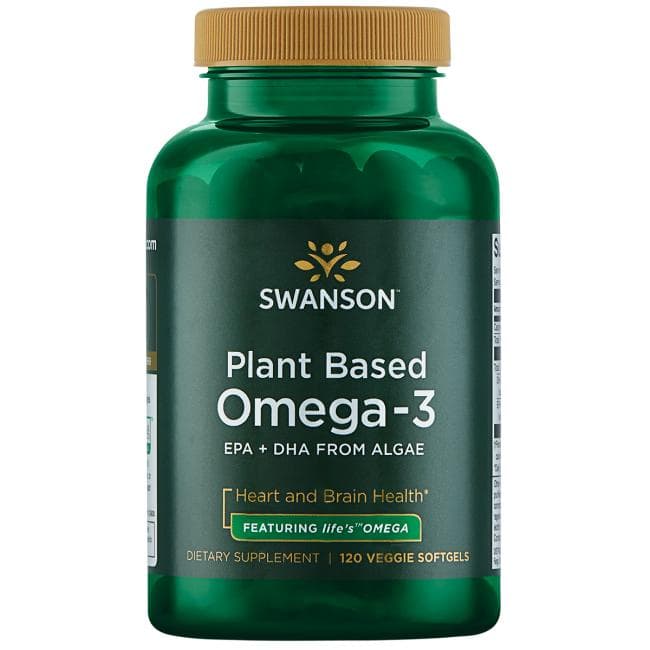
This premium, award-winning supplement features life’sTM OMEGA, which delivers the highest concentration of EPA and DHA available in a plant-based product. This non-GMO, sustainably sourced, vegan omega-3 supplement is your premium antidote for everyday stress.
How & When to Take
Take one capsule of Swanson Omega-3 Fish Oil twice per day with food and water, or take two capsules of Swanson Plant Based Omega-3 once per day with food and water. You can take either of these supplements with any meal during your day.
For the Tough to Digest
Pizza night again? We get it. Sometimes life gets in the way of even the best intentions. And the truth is, the typical modern diet isn’t really all that balanced, which can lead to issues with your digestion that can have a domino effect on your health. About 70% of your immune system is in your digestive tract, and your digestive health also affects nutrient absorption, sleep quality and more.21,22
Your digestive system is home to trillions of good and bad microbes, and the foods you eat affect that balance. Eating a healthy, real foods diet that’s rich in whole grains, legumes, fruits and vegetables provides essential nutrients like prebiotic fiber, which helps feed the healthy bacteria (microflora) in your gut to promote balance so the good bacteria outweigh the bad.
In a perfect world, we would always eat that way. But this is reality, and probiotic supplements are here to help.
Science Behind Probiotics
Probiotics supplements help reinforce the healthy bacteria in your gut by delivering beneficial yeasts and friendly bacteria strains right where you need them most to help fend off the bad guys, support a balanced digestive system and more.
There are several probiotic strains, with Lactobacillus and Bifidobacterium being the most common and the most researched. Lactobacillus produces enzymes that break down lactose, and they also produce lactic acid, which helps control the population of harmful bacteria and boost the body’s ability to absorb minerals.23 Bifidobacterium is native to the gut, supports the immune system and limits the growth of harmful bacteria in the intestine.23 There are many different types of strains (within these two species) that contribute to a positive microbiome.
Get Started
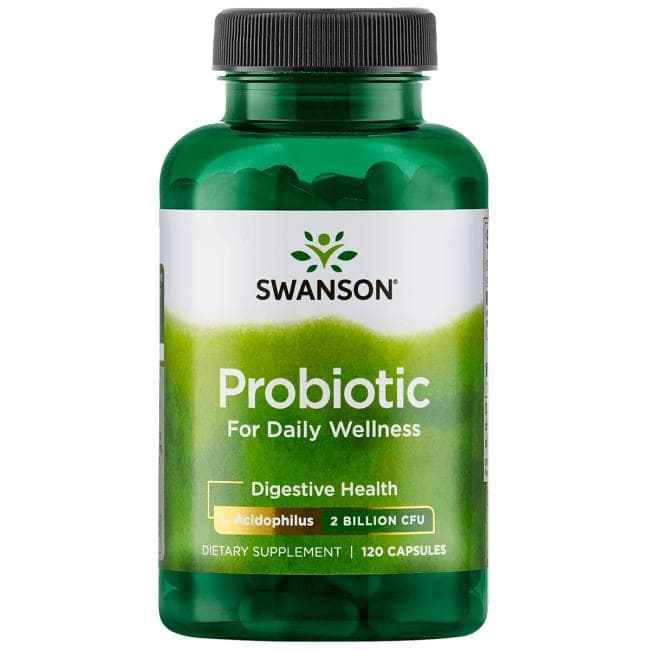 Swanson Probiotic for Daily Wellness
Swanson Probiotic for Daily Wellness
This daily probiotic supplement nurtures a healthy gut microbiome for digestion and immune support. Swanson Probiotic for Daily Wellness contains Lactobacillus acidophilus, one of the most researched strains for digestive health.
Elevate Your Routine
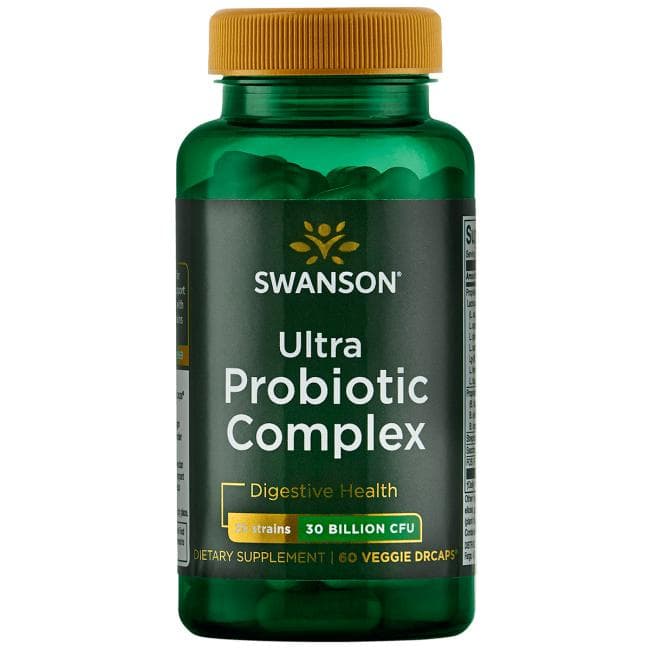 Swanson Ultra-Probiotic Complex
Swanson Ultra-Probiotic Complex
This comprehensive formula nourishes your gut with broad-spectrum probiotic support, delivering 30 billion CFU from 25 carefully-selected strains backed by solid science, including seven species of Bifidobacterium and the probiotic yeast Saccharomyces boulardii, a favorite among travelers, plus prebiotic fructooligosaccharides (FOS) to nourish good gut bacteria and help them thrive. It’s our most comprehensive supplement for supporting a healthy, bio-diverse gut biome.
When to Take Probiotics
Adults can take two capsules of Swanson Probiotic for Daily Wellness once per day with water before a meal of choice. Alternatively, take one capsule of Swanson Ultra-Probiotic Complex with water any time of day (no meal required).
And for the Badly Needed Rest
Some of us are night owls by choice—but most of us? Not so much. A study published by the Centers for Disease Control and Prevention (CDC) reports that about 30% of American workers are sleeping six hours or fewer each night, which equates to about 40 million sleep-deprived people.24
Even if you think you can function just fine on too little sleep, reputable studies disagree, and you’re accruing a sleep debt that can affect your cognitive abilities, make you irritable or worse: more accident prone. It can also contribute to health issues because, if you don’t get enough sleep, it can affect your immune system too!25,26
If you have trouble falling asleep or staying asleep, your body may not be producing enough natural melatonin.27 And remember the blue light exposure we mentioned above? That can also affect your melatonin production too, especially if you have a habit of getting in some screen time before bed.
So, what can you do about too little sleep? Melatonin supplements can help you get your sleep-wake patterns back on track.
Science Behind Melatonin
Melatonin is a hormone produced in your brain. It’s responsible for maintaining your body’s 24-hour sleep and wake cycle.28 In the evening or at night, your body should naturally produce and release more melatonin to signal your body that it’s time to sleep, with melatonin levels falling again in the morning hours.28 Studies show that melatonin levels can decrease after puberty and throughout middle age, which may lead to sleep and other health concerns.29
If you have trouble falling asleep or staying asleep, a melatonin supplement can help reset your natural sleep-wake cycle. Melatonin supplements should only be used at the appropriate time of day, and only in recommended amounts.
Get Started
 Swanson Melatonin Dual-Release
Swanson Melatonin Dual-Release
Swanson Ultra’s Advanced Dual-Release Melatonin takes its cue from nature, releasing melatonin in stages, just as the body does when preparing for a restful night. You get 1.5 mg right away, when you need it most, and another 1.5 mg is gradually released throughout the night to ensure that you get the rest you deserve.
Elevate Your Routine
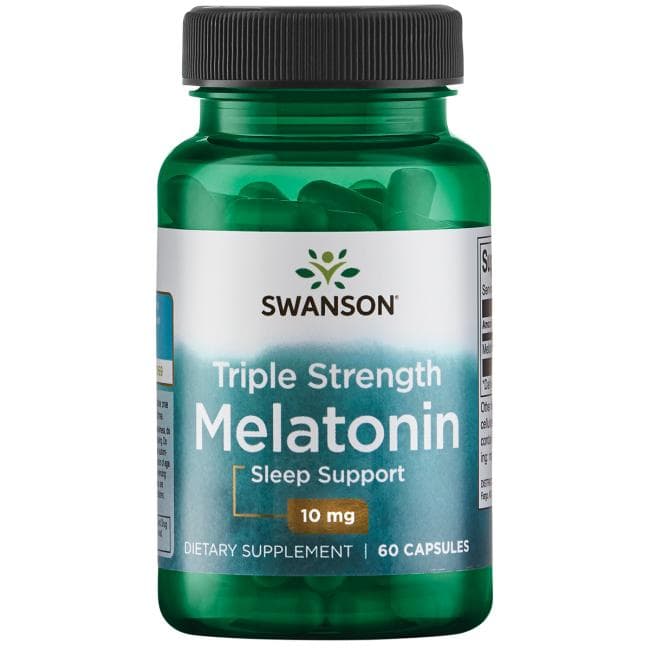 Swanson Triple Strength Melatonin
Swanson Triple Strength Melatonin
Our most potent formula for encouraging healthy sleep-wake patterns, Triple Strength Melatonin helps regulate the body’s circadian rhythm with 10 mg of melatonin, which also acts as an antioxidant, helping combat free radical damage associated with aging. Research indicates that two to 12 mg of melatonin taken at bedtime for up to four weeks may help get your natural sleep-wake rhythm back on track.30
When to Take Melatonin
For a better night’s rest, take one capsule of Swanson Melatonin Dual-Release with water 20 minutes before bedtime, or take one capsule of Swanson Triple Strength Melatonin with water 30 minutes bedtime—or follow the directions of your healthcare provider.
Your Antidotes for Everyday Life
We’re passionate about helping you conquer life’s challenges in a healthier way. So when life throws a lot at you, fight back with Swanson’s Antidotes for Everyday Life to help you combat digital device blue light from too much screen time, minimize daily stress effects, stay energized all day long, maintain a healthy gut and get restful sleep so you can wake up feeling refreshed and ready to conquer your everyday, again and again.

About Lindsey Toth, MS, RD
Registered Dietitian, Swanson Health Products
Lindsey is a nationally recognized registered dietitian and nutritionist with a soft spot for ice cream. She empowers people to take charge of their health by finding the balance between the pleasure and nourishment in food.
Her philosophy is that you should take care of your body because it’s the only permanent home you have. It’s what inspired her to pursue a career in nutrition and, ultimately, led her to Swanson Health.
*These statements have not been evaluated by the Food and Drug Administration. These products are not intended to diagnose, treat, cure, or prevent any disease.
Sources
1. Americans Use Electronic Media 11+ Hours A Day. Statista. Read source
2. Americans Check Their Phones 8 Billion Times a Day. Time Magazine. Read source
3. How Blue Light Affects Your Sleep. WebMD. Read source
4. Dr. Vijaya Juturu on Blue Light and Lutein. Swanson Health Products Facebook Live Video. Watch source
5. Blue Light and Screens. Optometrists Network. Read source
6. The Photobiology of Lutein and Zeaxanthin in the Eye. National Library of Medicine. Read source
7. Lutein. Medline Plus. Read source
8. Lutemax2020. OmniActive. Read source
9. Why Multitasking is Bad for You. Time Magazine. Read source
10. Health Benefits of B Vitamins. WebMD. Read source
11. Can We Say What Diet Is Best for Health? Annual Review of Public Health. Read source
12. The Effects of Stress on Your Body. WebMD. Read source
13. Chronic Stress Puts Your Health at Risk. Mayo Clinic. Read source
14. Omega-3 Supplements. National Center for Complementary and Integrative Health. Read source
15. Anxiety and Omega-3 Fatty Acids. Psychology Today. Read source
16. Positive Psychological Well-Being and Cardiovascular Disease. Journal of the American College of Cardiology. Read source
17. Food for Mood. Frontiers in Physiology. Read source
18. Long-chain omega-3 fatty acids. National Library of Medicine. Read source
19. Omega-3 Fatty Acids and Heart Health. Circulation Journal. Read source
20. Omega-3 Fatty Acids. Plos One. Read source
21. Let’s Talk About Health. Google Books. See source
22. Dietary Prebiotics. Frontiers in Behavioral Neuroscience. Read source
23. What are the Most Common Types of Probiotics? HealthLine. Read source
24. Short Sleep Duration Among Workers. Centers for Disease Control and Prevention. Read source
25. Sleep Debts Accrue When Nightly Sleep Totals Six Hours or Fewer. Science Daily. Read source
26. What Happens When You Don't Get Enough Sleep? Cleveland Clinic. Read source
27. Neurobiology, Pathophysiology, and Treatment of Melatonin Deficiency. National Library of Medicine. Read source
28. Melatonin: What You Need to Know. National Center for Complimentary and Integrative Health. Read source
29. Melatonin. PubMed. Read source
30. Melatonin. WebMD. Read source
Updated 4/19/22
